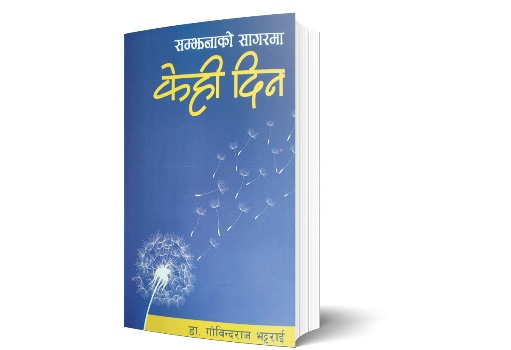Boyhood Memory

Gandhi Raj Kafle
It is difficult to be selective to find out some golden moments of life in the messy ocean of memory as it requires a combined help of mind and heart to accurately interpret personality even in the mature period of life.
Yet, creative persons take such a challenge and try their best to make a canvass of their life. The genres of literature like- memoir, autobiography, and biography- all build up from features of factual accuracy/inaccuracy of life. Literary writing is an art and it is not free of challenges. Authors test their life in the prism of skills and talent this way.
Dr Govinda Raj Bhattarai, whose aim is to be a creative person, has gained a new enthusiasm because of the freedom of feelings post his retirement as a long-serving professor of the Tribhuvan University (TU). His retirement offered him a golden moment to fulfill his wishes of the heart to pen literary pieces.
Yet, life's background, too, is no less important. And, he has it for him already. He has travelled extensively both inside Nepal and outside of it. This can also be an important merit for him to make his writing wide.
But, does it mean the role of the roots of life is a thing to cover and forget? If we regard a tree is a tree only because of its seed and plant, which was sown and grown long before, what kind of childhood or boyhood Dr Bhattarai had? This is just a curiosity. How is an author born? How does a potential author perceive things in his/her early life? Could it be noticed by some members of the family or society? Is there any instance, where such predictions come?
This seems to be a mystic curiosity also. Life builds up with dilemmas and complexities, too. We can't deny it. Dr Bhattarai, too, has passed through such time and he has tried to focus on such things, especially from his boyhood period in this book.
The under review book, which is brought out by Kathmandu's noted publisher Ratna Pustak Bhandar, falls under the memoir genre of literature. Can there be any fascination for readers to read this memoir, which has been written after so many years now?
The attraction towards a book may be weak if the book lacks literary flavour. But here what we find is the book is full of this literary art – the style of writing – description – honesty of presentation. Dr. Bhatttarai likes Montaigne's words "It is not my deeds that I write down; it is myself, my essence". It must be said he has completed the writings of this book in the spirit of words of Montaigne.
This 172-page book is made of 18 essays. For all pieces of essays, he is the theme; his essence is there to focus on. If we admit to the fact that self-portrayal is a difficult job, it is a difficult work that has been completed by the author here because many authors of a memoir feel the ease to show their life dominantly through the past life experiences, which give a pompous finish to their work.
Dr Bhattarai, however, has not followed this way; rather he depends on himself and his beloved past, and his long devotion to literary writings and freshly the present mature time has helped him to reach even that distant boyhood time for stirring early nostalgia to write this memoir.
Is the 'Some days in the ocean of Memory a circle of Dr. Bhattarai's nostalgic memoir? In a way, it is full because, from the starting piece 'That Hangdeva keeps appearing in the curtain of my childhood memory' to the last piece of this book 'falling tears of happiness in the golden jubilee', the thing to read in this book is not partial.
Dr. Bhattarai is satisfied and there is no reason to feel unhappy for him to get an opportunity to take the seat of the chief guest at the school's golden anniversary, from where he completed his school education. The gap between the base and peak of life's struggle and success can be known from this description.
Dr. Bhattarai's horizon to decorate his writing canvass is praiseworthy because he knows how to provide respect to characters that keep coming right from the time of his beginning life to right now. Thus, it is a description, where he has been respectful to mention names of close persons and places of distant past and he has done it attaching due importance both sentimentally and factually.
Last but not least feature about this book is the author has beautifully applied the regional literary flavor of writing from East Nepal. The book is inspiring in the sense that it describes the author right from the time he grew up in a humble background to the present where he has successes to count both in terms of creativity and professional career. Dr. Bhattarai needs to be congratulated not because he penned down an all-remembered memory, but he has also been skillful to pen a literary work out of his semi-remembered memory.
Recent News

Do not make expressions casting dout on election: EC
14 Apr, 2022
CM Bhatta says may New Year 2079 BS inspire positive thinking
14 Apr, 2022
Three new cases, 44 recoveries in 24 hours
14 Apr, 2022
689 climbers of 84 teams so far acquire permits for climbing various peaks this spring season
14 Apr, 2022
How the rising cost of living crisis is impacting Nepal
14 Apr, 2022
US military confirms an interstellar meteor collided with Earth
14 Apr, 2022
Valneva Covid vaccine approved for use in UK
14 Apr, 2022
Chair Prachanda highlights need of unity among Maoist, Communist forces
14 Apr, 2022
Ranbir Kapoor and Alia Bhatt: Bollywood toasts star couple on wedding
14 Apr, 2022
President Bhandari confers decorations (Photo Feature)
14 Apr, 2022










